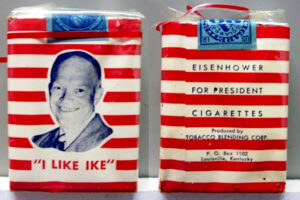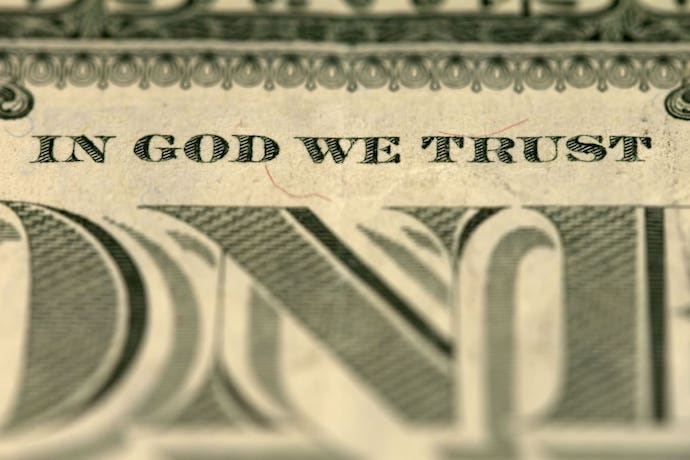Before the late 1960s, it would have been hard to find anyone in the USA who called themselves an Asian American. Despite there being over a million people in the country who fit the description, the term wasn’t used by people of Asian descent to identify themselves. Then, in 1968 the student activists Emma Gee and Yuchi Ichioka started the Asian American Pacific Alliance in Berkeley as a way to gather all those of Asian descent under one mantle. Now, some half a century later, the category “Asian American” is used widely by millions of people in the USA to describe their racial identity. What was once a category used by a few is now used by many as a way to shape identity and group belonging. The point is that just because a group of people doesn’t use a term to describe themselves doesn’t mean that the term is inaccurate or that a group who fits the characteristics doesn’t exist.
Despite the rudimentary logic at play here, we continue to hear that Christian nationalism must surely not exist, or barely exist, or exist only in the minds of sociologists and political scientists, because so few Americans identify themselves as Christian nationalists. This is exactly the line of thought used by former Newsweek editor Kenneth Woodward in a recent op-ed for the Washington Post.
Woodward begins by explaining that he answered the questions used by Whitehead and Perry in Taking America Back for God (though strangely he doesn’t mention the book or authors explicitly).
Here are the questions Woodward answered.
The federal government should:
- Declare the United States a Christian nation.
- Advocate Christian values.
- Enforce strict separation of church and state.
- Allow the display of religious symbols in public spaces.
- Allow prayer in public schools.
- And finally: “The success of the United States is part of God’s plan.”
Whitehead and Perry categorize respondents to these questions into four categories:
- Ambassadors of Christian nationalism;
- Accommodators of Christian Nationalism;
- Skeptics of Christian nationalism; and
- Rejectors of Christian nationalism.
Woodward scored as an Accommodator:
“Despite my total opposition to the first and last statements, my tempered support for the other propositions, mainly on First Amendment grounds, identifies me as an accommodator.”
Instead of defending Accommodators of Christian nationalism or explaining why such a position is not antithetical to democracy, as many claim, Woodward takes a hard rhetorical turn to the Right. After scoring as a Christian nationalist, he claims that, because he doesn’t know any Christian nationalists, it’s hard to believe they exist in significant numbers.
My problem, though, is this: I don’t know any Christian nationalists. Perhaps that’s because there are not in fact that many of them. A 2022 survey by the Pew Research Center found that more than half (54 percent) of adults in the United States had never even heard of the term “Christian nationalism,” and another 17 percent or so had heard only “a little bit.” Of the 14 percent who had heard “quite a bit” or “a great deal,” only 5 percent held a favorable view of it. Another 24 percent were unfavorable. That’s not a base broad enough to support a populist movement.
Notice the line of argumentation: If people don’t self-identify as Christian nationalists, they must not be Christian nationalists. This is akin to saying that despite there being over a million people of Asian descent in the United States in 1968, there must not be many Asian Americans in the country since so few identify as Asian American.
Woodward uses this strategy to avoid confronting what it means to be an Accommodator of Christian nationalism. He doesn’t explain why this is a defensible position to hold in what’s meant to be a pluralist, secular democracy wherein no religious group is privileged in law or society. Instead, Woodward makes the specious claim that Christian nationalism is hard to find, and thus it may not be worth taking seriously as a descriptive category.
If that isn’t bad enough, Woodward points to how his father—and his father’s generation—would have identified as Christian nationalists, but not in the way one might expect.
There was a time when I would have known numerous people who might have answered to the description “white Christian nationalist.” I’m sure my father, a White born-again Christian, was one. His generation lived through two world wars, an experience that made it very difficult to distinguish between nationalism and patriotism—or between religion and nationalism during the subsequent Cold War against atheistic communism.
Observe the subtle manipulation of terms here. Woodward claims that his father’s generation would have identified as Christian nationalists because they lived in a time when religion and nationalism were hard to distinguish. The appeal to the Greatest Generation is meant to instill in the reader a sense that Christian nationalism can’t be so bad if it’s just a bunch of God-fearing patriots who love America.
He continues:
But if their white Christian nationalism did wear a human face, it was not of night-riding Klansmen in white hoods, but of Dwight D. Eisenhower, who led America’s “crusade in Europe” as Supreme Allied Commander during World War II, added “under God” to the Pledge of Allegiance as president, and in 1955 was declared (by the Republican National Committee) “not only the political leader, but the spiritual leader of our times.” Now there was a real white Christian nationalist.
By using the example of Eisenhower, Woodward is extending his argument. You can see him shrugging innocently before muttering: “If Eisenhower was a Christian nationalist, well then color me one too, am I right boys?”
Here’s the thing. Eisenhower was a Christian nationalist who did more than perhaps any twentieth-century president to privilege Christianity and theism in American government and culture. Constitutional lawyer Andrew Seidel laid this out succinctly on social media recently:
1952: National Day of Prayer
1953: National Prayer Breakfast
1954: “In God we Trust” put on postage stamps
1954: “under God” added to the pledge
1955: Prayer room built in Capitol
1956: “In God We Trust” adopted as national motto
1957: “In God We Trust” appears on paper currency— Andrew L. Seidel (@AndrewLSeidel) May 10, 2023

‘I Like Ike’ cigarettes. So innocent.
All of this (except for the National Day of Prayer) was done during the Eisenhower administration. By using Ike as his “innocent” historical example of a real live White Christian nationalist Woodward thinks he’s exonerating himself and others like him. But his claim only reinforces the worry that many have sounded about Christian nationalism’s effects on our American public square: It not only privileges Christianity over other faith traditions and secular worldviews, but it is so embedded within the mainstream of American culture that it can be hard to see without using descriptive analytical categories to bring it to light.
As I argue in Preparing for War, You don’t have to be a Klansman to cultivate a White Christian nationalist culture. You can be a sitting president who used his executive power to put “In God We Trust” on our currency, relegating those who are polytheists and non-theists to a marginalized position.
Woodward saves his most blithe claim for last: “The fundamental problem with finding Christian nationalists is that no one can agree on what the term means.” The idea that a term or category isn’t viable because there isn’t consensus on what it means is a bad faith rhetorical strategy. We live in a world where there is rarely consensus. If Woodward applied this logic to his own faith tradition, we might say: “The fundamental problem with finding Christians is that no one can agree on what the term means.” Which is, of course, ridiculous.
Woodward finishes the piece with a conclusion that relies on the type of bad faith tactics that mark the entirety of the argument:
Opinion surveys have their uses, but not when they produce stereotypes and scapegoats. I learned nothing from these polls about the kinds of work that white Christian nationalists are apt to do, where they fit in terms of income, education or social class. Worse, I cannot hear their voices, much less listen to their anger or their dreams.
It should be noted that Woodward does nothing in his argument to dispel myths about White Christian nationalists. Instead, he claims that, because he doesn’t know anyone who uses the category to describe themselves, all the discussion of Christian nationalism must be nothing more than a quixotic quest to demonize people of faith. His assertion about stereotypes and scapegoats simply doesn’t follow from his argument.
Moreover, his frustration at not being able to hear the voices, anger, or dreams of supposed Christian nationalists in survey data is another rhetorical sleight of hand. Surveys aren’t meant to communicate those things. He’s claiming, in effect, that the milkman didn’t deliver any orange juice—and then leading the reader to think that this must be a failure on the part of the milkman, instead of the child on the stoop waiting for something he could find elsewhere, but refuses to look for himself. There are plenty of historical and journalistic accounts of Christian nationalism that provide an on-the-ground view of the affect, emotion, and desire of Christian nationalists. But it’s easier to claim things aren’t real just because you can’t see them yourself.
And that claim, in this case, represents an unwillingness to face the dangers Christian nationalism poses to democracy. It represents a Christian who would rather claim a problem doesn’t exist than face the ways it’s affecting the health of our republic.
O ye, of little faith. Let those with eyes to see . . . you know the story.
Correction: Woodward was initially identified as an evangelical Christian. He is in fact Catholic. RD regrets the error.


